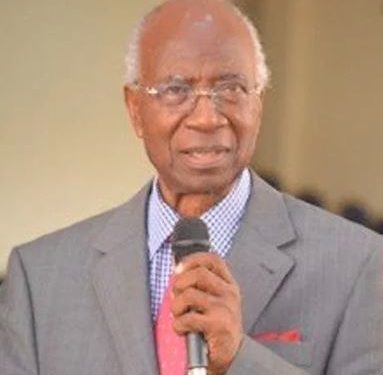
WITH the passing of Professor Oladipo Olujimi Akinkugbe, Nigeria has certainly lost one of its illustrious sons in academia, medical practice, and public service.
Akinkugbe was born into one of Nigeria’s most prestigious families—the Akinkugbe and Oladapo extended family. He started his secondary education in 1944 at the age of 11 years at Ondo Boys’ High School (OBHS), Nigeria’s first community secondary school. Apart from growing up under a father who was himself a student of Ibadan Grammar School at its founding in 1913, and the first druggist in Ondo Province, the young Akinkugbe came across the science notes of his friends attending Government College, Ibadan.
There and then, Akinkugbe decided that he would prefer studying science to the humanities available at OBHS. Before the end of the school year, he took entrance examination to Government College, Ibadan, and was admitted, thus embarking on a lifelong scientific journey that would later bring him to a distinguished career in medicine and medical science. He ended that journey on June 15, 2020, after making outstanding contributions to the development of cardiovascular and renal science and medicine.
Akinkugbe had a very distinguished career—studying, teaching, researching, and participating in university administration at many of the world’s universities. He attended the University of Ibadan for his first medical degree; University of London for specialist training; and Oxford University for doctoral studies. During his career, he obtained fellowships to study and teach in many of the world’s top universities: Johns Hopkins, Yale, Washington, Oxford, Harvard and many others. He was the first professor of medicine appointed by an African university and at age 35, three years after joining the University of Ibadan as lecturer I, after returning from advanced medical training and practice in England on Western Nigeria scholarship.
More importantly, Akinkugbe demonstrated throughout his life an abiding personal mission to give back to society in whatever ways he could—making stellar contributions to medical science, development of higher education, and promotion of academic excellence. He served as vice chancellor of two federal universities—Ilorin and Ahmadu Bello with integrity and a high sense of patriotism. In addition, he served as the first chairman of the Joint Admissions and Matriculation Board (JAMB), Pro-chancellor, University of Port Harcourt, and Chairman Planning Committee of Ondo State University and University of Abuja. He was founder of the first Hypertension and Kidney Clinics in Africa at the University of Ibadan.
With his book: High Blood Pressure in the African: Priorities in National Health Planning and many other peer-reviewed articles on cardiovascular and renal science, Akinkugbe carried the name of Nigeria to other countries as a respected international consultant. He served as a member of Uganda’s University Grants Commission; Secretary of World Health Organization’s Technical Discussions on Universities and Health for All; member, WHO Advisory Committee on Health and Research, consultant to WHO Expert Committees on Cardiovascular Diseases, Smoking Control, Professional and Technology Education of Medical and Auxiliary Personnel, and a Visiting Professor of Medicine at University of Cape Town after the apartheid era.
He received several awards for his contributions. He was a recipient of the National Honour of Cote d’Voire, Nigerian National Merit Award, the Boehringer Ingelheim Award of the International Society of Hypertension, and Honorary Doctor of Science from Federal University of Technology, Akure, to mention a few.
Although Professor Akinkugbe was born into a privileged family, he lived his life with passionate commitment to egalitarianism and democratisation of access to education, which he promoted as dean of medical faculty at Ibadan, founding vice chancellor of the University of Ilorin, and as teacher and mentor to students and colleagues in Nigeria and elsewhere.
There is no better citation for Akinkugbe’s egalitarian spirit than an eye-witness’s account of his relationship with his patients: “Akinkugbe was humane and honest. Empathy was one of his major attributes, he understood the emotions and disposition of those who were indisposed. He was good at informing and educating the sick to have knowledge of their ailments and to act and make decisions based on that knowledge.”
The obituary announcement by the Vice-Chancellor of University of Ibadan, where Akinkugbe was Emeritus Professor: “The death of Baba Akinkugbe is not only a loss to his family but the entire academic world who will miss his rich academic and administrative inspiration” aptly depicts the man of high culture and high achievements in many sectors of modern life in Nigeria and beyond.
END

Be the first to comment